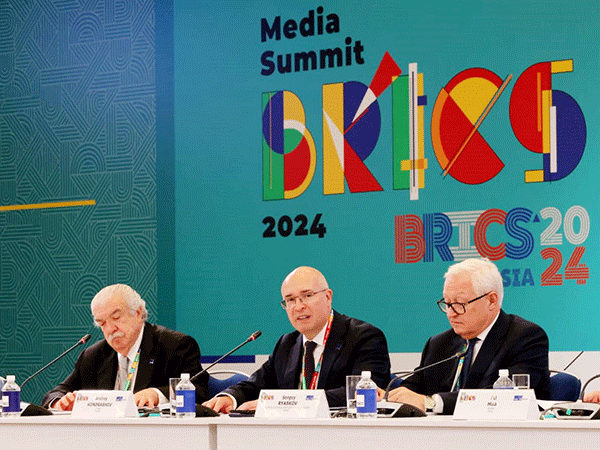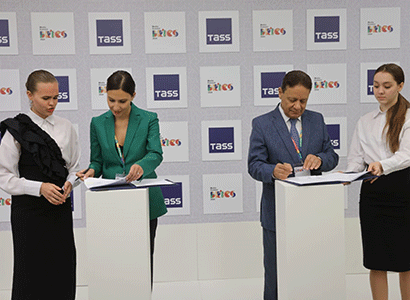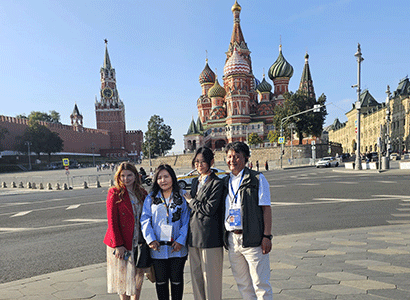The success of the 7th BRICS Media Summit
Participants from BRICS countries will use their information resources to help establish a fair and equitable multipolar world order based on international law and the principles of equality, respect for sovereignty, non-interference in internal affairs, and shared security.
The 7th BRICS Media Summit, organised by the Russian News Agency TASS, took place successfully from September 13-17 in Moscow. The summit coincided with the 120th anniversary of TASS, celebrated on September 1. This year’s event brought together heads and leading professionals from over 60 media outlets representing 45 countries.
Opening the summit, Director General of the Russian News Agency TASS, Mr Andrey Kondrashov, highlighted BRICS’ role as a significant force in global political, economic, and humanitarian affairs. He emphasised the need for media leaders, like the leaders of BRICS nations, to coordinate efforts in building a fairer world order.
 |
| Director General of the Russian News Agency TASS, Mr Andrey Kondrashov (centre), delivers the opening remarks at the BRICS Media Summit on September 14 in Moscow. President of the Xinhua News Agency, Mr Fu Hua (right), and First Deputy Director General of TASS, Mr Mikhail Gusman, are also in attendance. |
President of the Xinhua News Agency and executive chairman of the BRICS Media Forum, Mr Fu Hua, delivered a keynote speech acknowledging the unprecedented changes facing the world today.
He pointed out that the BRICS countries are vital in promoting common development, bringing stability to an uncertain global economy, and maintaining regional and global peace.
Mr Fu also stressed that the BRICS nations have played a crucial role in upholding the common values of humanity and in shaping a community with a shared future for mankind. He expressed optimism about the future of BRICS cooperation and development.
In a video address, Russian Foreign Minister Sergey Lavrov praised the increasing collaboration among media outlets from BRICS nations, noting their critical role in fostering transnational trust and interaction. He also welcomed the participation of media representatives from other Global South countries, underscoring the summit’s inclusive nature.
The summit covered various aspects of international journalism, especially in the context of rapid technological advancements.
Participants discussed the media’s role in fostering stability and cooperation in a multipolar world and the technical transformation of BRICS media as they navigate this new global landscape.
The final declaration of the summit outlined nine points emphasising the role of media outlets in supporting and strengthening international dialogue.
BRICS media outlets pledged to use their platforms to promote a fair and equitable multipolar world order based on international law, respect for sovereignty, non-interference in internal affairs, and indivisible security.
The participants recognised the critical role of the media in fostering international dialogue and agreed to enhance coverage of BRICS cooperation across political, economic, and humanitarian sectors.
In addition, the summit reaffirmed a commitment to unbiased, fact-based journalism and emphasised the need for coordinated efforts to combat disinformation. The protection and safety of journalists, particularly those reporting in conflict zones, was also underscored as a top priority.
 |
 |
| The agreement signing ceremony between the Ministry of Digital Development, Communications and Mass Media of the Russian Federation and the Supreme Council for Media Regulation of the Arab Republic of Egypt. |
During the BRICS Media Summit, participants visit the Moscow Kremlin Museum and the Cathedral Square as part of a sightseeing tour. |
The participants acknowledged the importance of staying updated with advanced technologies and discussed the need for developing appropriate standards for the use of artificial intelligence (AI) in the media. There was a collective agreement to continue professional dialogue on AI and its applications in journalism.
Professional associations were recognised for their essential role in fostering media cooperation, with a commitment to continue working together within global and regional alliances.
This year’s summit marked a significant shift as it was the first time the event was held in the new format of the BRICS Media Forum - an independent, non-governmental, and non-commercial platform for dialogue among leading media outlets from BRICS nations.
The BRICS Media Forum, established in 2015 through an initiative by Xinhua, is hosted annually by the country holding the rotating BRICS presidency.
Russia assumed the presidency on January 1, 2024. In the summit’s closing declaration, media outlets from BRICS countries agreed to work collectively toward constructing a fair multipolar world order using their information resources. The document also stressed the media’s role in strengthening international dialogue and ensuring comprehensive coverage of BRICS and BRICS+ initiatives.
The BRICS Media Summit continues to stand as a vital platform for media cooperation, with this year’s gathering further solidifying the media’s role in shaping a just and multipolar
world order.
By Times Reporters
(Latest Update September 23, 2024)
|




